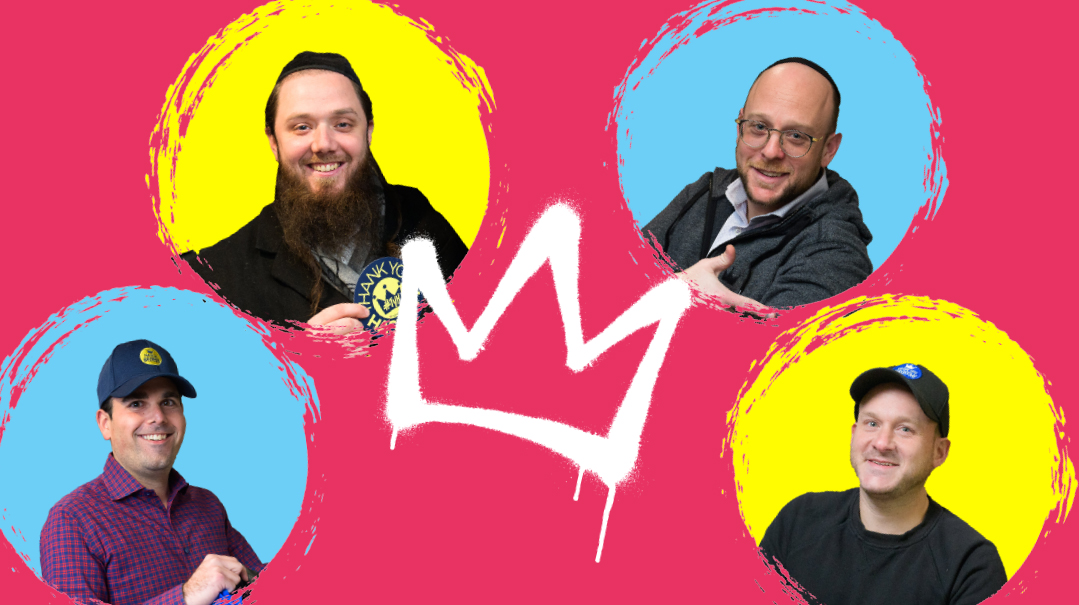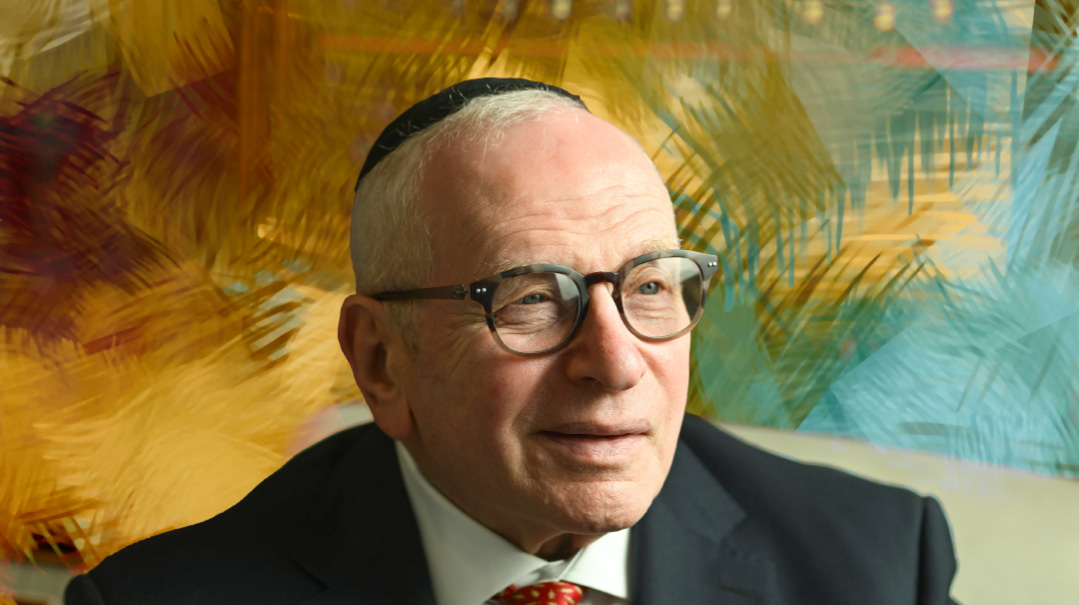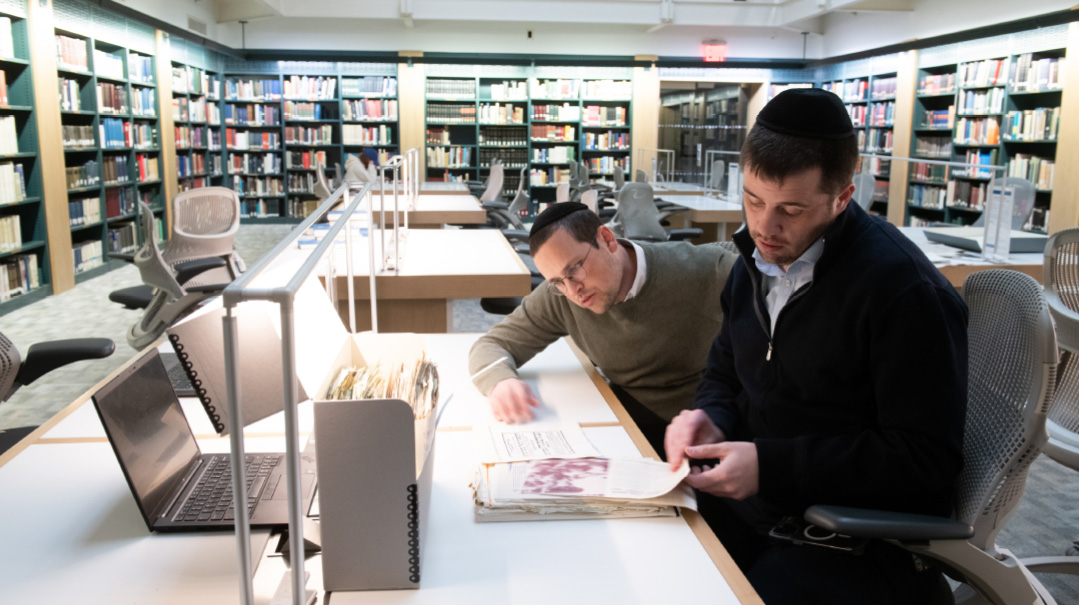Gratitude Nation

Sing, dance, and reconnect along with the Thank You Hashem nation

Its a frigid winter night, but inside this comfortable Lawrence home there’s a warmth generated by something other than the heating system. It’s a spark that emanates from a group of friends huddled around, kumzitz-style, jamming and brainstorming their newest ways to spread a message of ahavas Yisrael, spiritual connection, and, above all, THANK YOU, HASHEM!
Yep, these are the guys — Aryeh Blumstein, his brother Elimelech, singer Joey Newcomb, and Yakov Josephy, with the help of a cadre of friends and supporters — who launched that quintessentially grassroots, infectiously exuberant movement to promote gratitude, positive thinking, and chassidic ideas throughout the Jewish community. You’ve surely seen their swag: the stickers, bracelets, hoodies, and keychains sporting the logo of a little crown and the words “Thank You Hashem!” Their online posts compel thousands. Every song they release goes viral. An idea that might have once been dismissed as a fad has become a badge of cool consciousness and dveikus.
So how did a bunch of FiveTowns guys in their thirties launch an international craze? And how did their hallmark phrase manage to inspire Jews of all ages to deepen their relationship with Hashem? The group was eager to share their story.
The Inspiration
Aryeh Blumstein, one of the movement’s initiators, is our host tonight. His brother Elimelech is the creative arm and together, these two brothers kindled the flame that ignited the TYH fire.
The Blumstein brothers are the oldest sons in a clan of 11 children, a family in which outreach is the family business. Their father, Rabbi Heshy Blumstein, is the rav of Yismach Moshe in Woodmere, Long Island, the type who pulls people off the street and brings them home for Shabbos. “He’s our inspiration,” Elimelech says. “He was always an out-of-the-box guy, and we grew up in a kiruv home that was full of ahavas Yisrael.”
While the TYH story is one of serendipity in Tzfas, its origins can be traced back to when Elimelech first grew enamored of chassidic teachings. An alumnus of Toras Moshe and Rav Yotzchok Berkovits’s kollel in Jerusalem’s Sanhedria Murchevet neighborhood, he’d worked for a few years in kiruv with JEC in Manhattan, a member OLAMI organization, before starting a menswear business called Twillory. During his yeshivah and kiruv years, he gained renown as a songwriter, composing songs for Benny Friedman, Dovid Gabay, Yaakov Shwekey, Avraham Fried, and Avi Perets. But as time went by, the inspiration waned and he let the mic drop.
“When I left the kiruv world to work, it was time to move on,” he says. “But I was feeling a bit second-class. I wasn’t surrounded by Torah all day anymore, and it felt like I wasn’t doing what I was supposed to in my avodas Hashem.”
That changed when he started going to shiurim from Rabbi Moshe Weinberger of Aish Kodesh in Woodmere and Rabbi Yussie Zakutinsky, the rav of K’hal Mevakshei Hashem in Lawrence. From them, Elimelech absorbed that the Baal Shem Tov’s teachings were meant to reach out to the everyday working person and help him connect to Hashem. “Ein od milvado, Hashem is everywhere,” Elimelech says. “You can connect to Him at yeshivah and at work; he gives us opportunities for growth during every step of life.”
Three years ago, Elimelech had a yen to visit Eretz Yisrael, to take a little time for himself, learn for a few days, and spend a Shabbos in Tzfas. He arranged a simple Shabbos with Aryeh, his friend Mikey Mause, and two other brothers who were learning in Israel at the time.
“We gave the caterer very specific instructions,” Aryeh relates, “but he completely bungled the order and delivered it 20 minutes before Shabbos. I said, ‘Hey! What is this? This is not what we ordered...’” The caterer’s casual, oddball response would launch the guys, and the Jewish world, into a new era.
It was a simple thing; an off-the-cuff shrug and: “Thank You, Hashem! Don’t worry, it’s all going to work out.”
Aryeh and Mikey thought it was a strange response coming from the caterer, given that Shabbos was so close and he had botched their order. But they went ahead with last-minute plans to go to the Arizal’s mikveh, and while they were gone, the caterer managed to scare up some bottles of soda and a little nosh. By the time the guys returned to eat, it didn’t even matter anymore. “The way the caterer had just smiled and said ‘Thank You Hashem’ with such sincerity was a feeling we had to tap into,” Aryeh remembers. It wasn’t the phrase that drew them, but the caterer’s nonchalance and humility.
Shabbos turned out pretty great. “The whole experience was so inspiring. We were screaming our hearts out during davening with all the other Jews,” Elimelech relates. “Everything was unplanned, but so magical.” Almost humorously, they kept flinging the caterer’s words at each other. “We were on a high,” Aryeh says. “Our Shabbos was transformed. That whole Shabbos we kept repeating, ‘Thank You Hashem!’ ”
It was only later that things started to sink in. They kept up the “Thank You Hashem” call back in the US, and remarkably, as Aryeh says, “I saw my relationship with Hashem becoming real. As I made a habit of talking to Hashem, He found a new place at the forefront of my mind, and I felt more connected than ever.”
Aryeh chalks it up to letting go and letting in. “On its own, saying ‘Thank You Hashem’ can be reflexive and disconnected. The power lies in how it gradually seeps into you and awakens your perspective on gratitude. You realize what hakarah means and does. Once a Yid is makir that absolutely everything is from Above, life is never the same. Simply talking to Hashem changes everything. Chassidus always emphasized hisbodedus, which is having a real, personal conversation with Hashem.”
Aryeh would know. In everyday business, he has many stakeholders who depend on him to helm the ship. But he believes otherwise: “None of us are in control. Ein od milvado. Gratitude is the door, the portal, to living a life full of emunah, free of worry, and enriched with the kind of intrinsic joy that reduces your sense of need and your pursuit of materialistic possessions.”
Seven months after Aryeh’s return from Tzfas, his wife, Shifra, gave birth to a healthy baby boy. Elimelech and some friends joyously met Aryeh at his home when he returned from the hospital. They’d ordered food, and the meal segued into a kumzitz around the fire pit. Sitting together, surrounded by the people he was most thankful for, Elimelech felt the first threads of a song come to him. “I’d written a lot in the past, but I’d stopped — I’d somehow lost the drive. But now it just came to me, with the words ‘Thank You Hashem.’ ”
He liked the song so much he recorded it as a rough demo.
Aryeh brought singer Moshe Storch in from Los Angeles for the bris, envisioning a spiritual simchah filled with song. He told him to sing “Thank You Hashem” when the baby was brought in, and recorded it. Everyone there was inspired, and Elimelech’s once-languishing talents were reignited.
“Since then, I’ve learned to compose songs as a form of davening. And once I internalized that, the music started flowing again,” Elimelech says. “If you think about it, the Baal Shem Tov brought music back to Judaism as a way to connect to Hashem. Music is a big part of Thank You Hashem, a way to inspire people, and every time we come up with a song we ask ourselves, ‘Is this a song we’d be proud to play for Mashiach, to sing with our tzaddikim?’ ”
He went on to write half the songs on Joey Newcomb’s new album How Are You, Reb Yid? and wrote others for Zusha, Pumpidisa, Beri Weber, and Yoni Z. There are many more in the works, to be released by Eitan Katz, Ari Hill, Moshe Storch, and Reb Hillel, a young artist the group works with.
In fact, Reb Hillel committed to publish a new kids’ album with the teachings of Thank You Hashem. Reb Hillel commented, “When Hashem sees you all gathered at a simchah and crying ‘Thank You Hashem’ in unison, He turns around and says, ‘Thank you, My children.’ ”
On the Wings of a Song
Two more members of the TYH inner circle have now arrived to join us: Yakov Josephy — Aryeh’s friend and fellow think-thanker — and singer/mashpiah Reb Joey Newcomb, towering over the rest of them in his long black coat and streaming peyos.
Two years ago, Joey was someone Aryeh had wanted to meet for a long time. “Aryeh had reached out to me that summer to do an event, but I was always booked,” Joey relates. “When he told me, ‘I guess Hashem doesn’t want us to get together, or else Mashiach will come,’ I knew I had to get to know him.” After hearing a demo of “Thank You Hashem,” Joey called and asked if he could put it on his new album.
That fall, Joey made time to join a group in Aryeh’s succah, for a gathering that went on into the wee hours. The two men hit it off and became very close.
“There’s an energy, a creativity Aryeh and I have in common,” Joey says. That summer, “Thank You Hashem” was released on Joey’s first album, catapulting Joey and the song into the spotlight.
To inspire a more global audience, the brothers entered the social media arena, and before they knew it, the account was burgeoning. The TYH philosophy distilled is “A grateful life is a great, full life,” and it caught on.
“People started sending in unbelievable stories,” Aryeh says, “about how Hashem is always close to us, how they were able to appreciate the good even in darkness. We were getting messages from parents, children, mechanchim, and kiruv professionals.” The partners started Spanish and Hebrew versions of the feed, and French and Russian are next in line.
The siyata d’Shmaya at every step of the way only reinforced the group’s resolve. As Yakov Josephy, the man behind the logistics puts it, “We’ve had kefitzas haderech on this journey.” The early days of COVID-19 underscored how vital TYH’s message was. “People were confused, fearful, sick and pained,” Yakov says. “We were racking our brains for things to do, for ideas to introduce, for ways to inject some desperately needed positivity into the communal public.”
With the financial support of a local benefactor, the winning idea was to put a concert on wheels and roll it around town. In the weeks before Pesach they procured a truck and drove all around the Five Towns with Joey Newcomb singing for the community. They sponsored Erev Shabbos dance-offs, TYH coloring books, and chesed toy drives to get toys to kids who were lacking. They provided Pesach food, paper goods, and gifts for those stranded at home with nowhere to go for Yom Tov; they gave out thousands of masks to people who were desperate and could not get their hands on them; and they offered many more programs in an effort to bring simchah to such a difficult time. Generous friends caught wind and lent a hand, and the “Thank You Hashem”s echoed.
“We were incredulous,” Aryeh related. “We saw simchah as the response. It was a time when people weren’t touching, hugging, or even saying shalom to one another, and the streets were suddenly filled with dancing figures. Can you imagine how inspiring that was for us?” That was when he realized that the ultimate power underlying gratitude is the joy that it engenders in the person.
Seeing the transformative power of gratitude gave Aryeh the idea to launch a TYH brand, with the help of Pinny Fisher, to help people from all walks of life bring its impact into their lives.
“Elimelech originally thought it was crazy,” he says, but was quickly won over to the idea. The two decided to test out a few items: bracelets, stickers, and caps. Aryeh asked Elimelech, the more artistic brother, to come up with a logo, something simultaneously relatable, cool, and holy.
Elimelech got to work, incorporating the image of a crown to convey the idea that every Jew is a ben Melech. “He told me he needed it ASAP, so I dashed it off fast,” Elimelech recalls. “That’s good, because if I had any idea then how big it would become, I would have obsessed for hours over it.”
To their astonishment, the promotional merchandise with the TYH logo flew off the shelves. “We saw that Klal Yisrael wants this,” Elimelech says. “We have an internal motto, ‘Awakening the thirsty spark that lies within every Jew.’ The Baal Shem Tov came into This World to wake people up. Our goal is to introduce people to their own souls, to the fire they have inside.”
Swag was a way to reintroduce Jews to spirituality in a way they may have never explored, connecting to Hashem through chassidus, and focusing on the unconditional love Hashem has for every one of us, no matter how far away one thinks he is.
“It’s easy to make the most out of your highest moments,” Elimelech explains. “The challenge is to make the most of your lowest moments. Our swag is a way to get people through the door, so they’ll start absorbing the Torah of chassidus that will transform their Shabbos tables, their learning, their relationships.”
Today, the website — tyhnation.com— features a wealth of Torah music and upcoming events, and gets thousands of visitors weekly. Content is not limited to swag and catchy quotes, no matter how insightful or profound. Rabbi Yussie Zakutinsky’s parshah shiurim are posted weekly and became extremely popular. Elimelech’s wife, Faigy — who had given shiurim to students in their home while her husband was in the kiruv world — now began giving shiurim on the sites, drawing hundreds of fans. Many devotees post stories about the way TYH has changed their attitude and made a difference, like the wife who reported, “Please keep doing whatever it is you do — it changed our whole family life. Hashem has become the focal point of our lives. Thank You!”
“It’s a crowd-sourced movement,” Aryeh says, “that is so much bigger than us. And yet, we could never have taken it this far without the help of some very dear friends.” Aryeh thanks all those involved from the beginning, and mentions by name Aryeh Weiss and Reuvein Moskowitz, whom he calls “wellsprings of support who are heavily involved” in this effort. “We are blessed that so many influential people joined our mission and helped us spread the word. But I must give a special shout-out to Charlene Aminoff from Gali’s Wigs who’s a true inspiration. She helped us from the beginning, and is a role model for how you can leverage such a large social media platform to bring Jews closer to Hashem.”
More Than a Slogan
It’s certainly true that repeating the phrase “Thank you Hashem” promotes a certain G-d-consciousness. But the TYH movement runs much deeper; it’s meant to draw people in and connect them to deeper spiritually. “We developed a tagline, ‘Welcome Him everywhere,’ that delineates the direct link between speaking to Hashem and seeing Him in every area in life, ” Aryeh says.
TYH is seeing a record number of young kids engaging with the movement. Children as young as 2–3 years old are wearing the swag and learning the phrase, and naturally, this gave the guys another idea. “We realized that we could get in early,” explains Yakov. “By introducing TYH to schools, we would reinforce gratitude from a young age.” So far, over 20 schools have invited a Thank You Hashem programming presentation, and it’s a concept that has proven to work equally well for Pre1A and beis medrash, each at its own level. Now the guys are thinking of turning the TYH concepts into an actual school curriculum, bringing in concepts of chassidus and connection.
Meanwhile, on the adult-audience front, something pulled at them to establish a little neighborhood shul, under the auspices of Rabbi Yussie Zakutinsky, with an emphasis on chassidus and penimiyus. “We never had any intention of starting a shul,” Aryeh says, “but strongly felt that a kehillah focused on penimiyus could transform our neighborhood and help bring many Yidden closer to Hashem.” Joey Newcomb served as baal tefillah for the Rosh Hashanah and Yom Kippur Mussaf this year, walking 35 minutes from his home in Far Rockaway. “Elul is a spiritual lovefest, a time when the Almighty King is in the field and aching for His beloved Klal Yisrael. But we were always taught to fear it. While the Yom Hadin should be viewed in full sincerity, we all need simchah, especially during dark times.”
During the month of Elul, TYH released an upbeat song with Pumpidisa, published beautiful TYH art with Shani Levin, launched new swag, and gave people a totally different, yet no less inspiring, Elul than they’ve ever experienced before.
Rabbi Zakutinsky says that this generation often gets a bad rap as shallow and superficial. But in his experience, it’s not true. “Young people have a deep craving for authenticity, for a Yiddishkeit that speaks to them,” he says. “They need to be engaged intellectually and emotionally, and when the neshamah gets a taste of something deeper, it recognizes what it’s been looking for.”
In the Business of Thanking Hashem
As Elimelech reminds us, Hashem is everywhere in the world, even the lowest levels. Nowhere is this more apparent than as we descend to the TYH storeroom (formerly known as Aryeh’s basement…) and enter a room housing every type of Thank You Hashem swag imaginable, floor to ceiling. Rows of cube storage shelves are filled with canvas bins piled with the ubiquitous TYH keychains, stickers, magnets, COVID masks, pens, caps, hoodies, and more.
The “business” of thanking Hashem has become so big that volunteers have joined to help with logistics and order processing. But Yakov qualifies that this is strictly a nonprofit business. “Every penny goes back into the TYH movement.”
Most remarkable about the TYH swag is how it has taken on a life of its own. “Charlie Harari told us not long ago, ‘This is great. Kids in the Five Towns aren’t asking for Nike and other high-end brands any more. They just want TYH gear.’” As Aryeh sees it, “You don’t have to be the gadol hador to affect Jewish hearts and souls around you. When you do something that inspires you, others in your circle of influence latch on automatically.” Aryeh insists that whatever he does under the TYH banner is not premeditated with the movement in mind. “We simply do things that inspire us.”
Aryeh shares a message someone shared with him, illustrating the power of the movement and the swag to inspire people, even while undergoing intense challenges.
“Thank You Hashem has impacted so many people, you can’t even imagine. It literally changed the way people think when they face a challenge. People aren’t just wearing the bracelets on their hands, they are wearing the concept in their heart. Hashem loves us, and when He throws us a challenge, we thank Him because He knows what is best for us.
One person sent us the following message:
“Our friend Alana (Chana Reva bas Reuven Moshe) was 40 and single, and that was only the first challenge Hashem gave her. She should be an inspiration to all older singles for the way she went out and with the most simchas hachaim that ever exists, enjoyed her life, made everyone around her laugh, clung to emunah, and very much became a huge TYH fan. Alana loved the concept and truly believed in it — Thank You Hashem was on her lips for everything.
“The big test came when, at 41, she was diagnosed with a rare form of leukemia. When faced with this second challenge, her reaction was 1) get me those TYH slippers in a ladies size please, and 2) what sefer should we learn together? This concept didn’t exist before TYH. When a person gets diagnosed with the known machalah to say, “Let me thank Hashem?” That’s remarkable! The stickers were on her fridge. The bag of slippers, magnets, sweatshirts and other bits were prepared for her first round of chemo. Unfortunately, that round was her last, and Hashem reclaimed her neshamah.
“We still go by every single day thinking, this makes no sense. This can’t be. Why did this happen? Still, we take Alana’s emunah and attitude and say, Thank You Hashem! We don’t get it now, but one day with the coming of Mashiach we will understand. At her shloshim, there wasn’t a dry eye around, as all her friends (and there was a range, from yeshivish to Modern Orthodox) united as one to sing Thank You Hashem in honor of Alana. Her nieces and nephews, and my son and daughter-in-law, still wear the TYH bracelets and masks they found in her apartment.”
As we leave Aryeh’s home, something catches my eye, not far from the door. It’s a wheelie carry-on suitcase printed with an image of the Kosel and the words “WE ARE READY!” Aryeh explains, “We all grew up with stories of tzaddikim who were always dressed for redemption. These are our Mashiach suitcases, designed to be packed and ready for the call. Waiting for him is not exclusive to gedolim; we are a nation that waits — a TYH nation.”
So, what’s next for this galloping movement? Aryeh is brimming with ideas: “Our mobile app is in full development. We’re readying new programs, shiurim, school partnerships, and other awesome new content.” When I asked him where he sees TYH five years from now, he answers simply, “I see all of us Yidden dancing together in the Beis Hamikdash, Thank You Hashem!”
(Originally featured in Mishpacha, Issue 850)
Oops! We could not locate your form.












